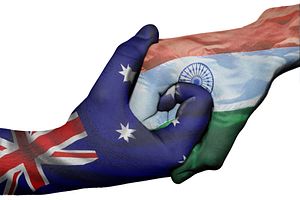India’s Prime Minister Narendra Modi’s drive to improve India’s relations with its neighbors successfully continues, with Australian Prime Minister Tony Abbott visiting India this week.
Abbott arrived in India on Thursday for a two day visit, starting in Mumbai. On Friday, he met Prime Minister Modi in New Delhi. This was their first meeting.
Abbott personally returned two looted 900-year old statutes of Shiva, the Hindu god of destruction and transformation, to Modi, arguing that returning the sculptures was “testimony to Australia’s good citizenship on such matters and the importance with which Australia views its relationship with India.” The statues had previously been stolen by an Indian dealer who sold them to Australian art galleries.
One of the two statutes, the statue of Nataraja, the dancing form of Shiva, was considered especially important. Nataraja’s whirling form represents the fact that destruction can become creation and degeneration, regeneration. Australia’s return of the statue comes at an interesting time, because Australia’s relationship with India is following a similar pattern of rebirth after a period of distance.
India and Australia sealed a long awaited nuclear deal during Abbott’s visit. Arguing that India and Australia were bound by “strongly convergent” trade and strategic interests, Abbott announced the finalization of a deal that would allow Australia to export uranium to India. Australia holds 40 percent of the world’s uranium.
This deal is very important for India because it frees the country to use its smaller domestic radioactive stockpiles for military purposes while giving it the ability to import Australian uranium for civilian power plants. Justifying his decision to export uranium to India, Abbott told reporters that “India has an absolutely impeccable non-proliferation record and India has been a model international citizen.”
Australia had not sold uranium to India in the past because India is not a signatory to the Nuclear Non-Proliferation Treaty. However, Australia’s ban on selling uranium to India was overturned by its previous Labor government in 2012. India is now expected to purchase significant quantities of Australian uranium in order to meet its growing energy needs.
Australia has warmed up to India in recent years, especially after Tony Abbott became its prime minister. Abbott has taken a very proactive role in foreign relations. Abbott’s visit to India is more about improving bilateral relations than merely inking a nuclear deal. As Abbott’s trip clearly indicated, Australia’s calculus towards India is now driven by geopolitical concerns over legalistic or ideological issues concerning proliferation or other matters. As Abbott stated in regards to India’s nuclear industry, “it’s not our job to tell India how to conduct its domestic affairs.”
While Australia will probably not be as important a partner for India in the Asia-Pacific as Japan, Indo-Australian relations will become more cordial after a period of near indifference. Australian government representatives suddenly found themselves not being snubbed after Australia’s ban on uranium exports to India was lifted in 2012. With the finalization of Friday’s deal, it looks as though Australians are set to be more warmly received in New Delhi than ever before, a must for two countries that are so close to each other geographically and share common strategic goals.

































